August 2019
National Repository facility inaugurate In Wildlife Institute of India
|
The National Biodiversity Authority has designated the Wildlife Institute of India as one of the National Repository under Section 39 of the Biodiversity Act 2002. This repository serves as safe custody of the different categories of Biological Resources including voucher specimens from Protected Areas of India. In order to maintain the deposit, the Wildlife Institute of India has established National Repository in the Institute, which was inaugurated by Dr. Erach Bharucha, WII Faculty Assessment and Promotion committee on 26 August 2019. During the occasion, Dr. H.S. Pabla, Chariman, WII-TRAC, Dr. V.B. Mathur, Director, Wildlife Institute of India, Dr. J.A. Johnson, Nodal Scientist, NBA National Repository, WII Centre and other faculty members were present. |
|
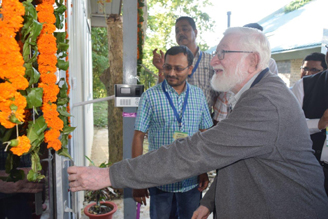 |
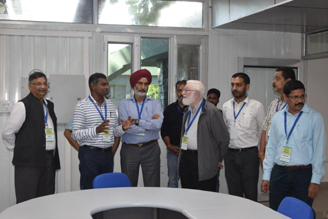 |
Last Updated: August 27, 2019
2nd Ganga Biodiversity Conservation Seminar (August 22, 2019)
|
The Ganga River has a vast geo-morphology, encompassing three biogeographic zones and spanning across five most densely populated states of India. Considering the state of the Ganga River, and its significance in Indian culture and religion, the project was initiated in 2016 with an aim to implement ecological elements in Ganga restoration, with the help of multiple stakeholders. With its first phase winding up, the seminar included a wide array of topics with a commonality of Ganga’s ecological restoration. Dr. Ruchi Badola, Scientist G and Project Co-coordinator, welcomed the dignitaries and guests. Dr. S.A. Hussain, Scientist G and Project Coordinator, provided an overview of the project. He emphasized the efforts made by the team and introduced the second phase of the project, which will implement basin level river conservation efforts from January 2020. Dr. Y.V. Jhala, Scientist G, Wildlife Institute of India said that it is important to make science meaningful to the people and thus the studies should focus on implementing science-based information and finding novel approaches to conserve rivers. Padmashri Dr. Anil P. Joshi, the Chief Guest of the seminar in his opening remarks, emphasized on the need of considering rivers as holistic ecosystems and acknowledging the deleterious impacts that human have on riverine ecosystem. He further highlighted the issue of water scarcity in the country and the need of involving local communities in river restoration, since watershed management activities at the grass roots level initiated by local communities ensure sustainability to the scientific efforts. The group then proceeded to release the Training database, Ganga Biodiversity Calendar for Bal Ganga Praharis, a booklet on Water Conservation Approach for Bal Ganga Praharis, Neelu story, and a brochure and leaflet on “Wetlands and Water Programme”. The Ganga Biodiversity Calendar, booklet on Water Conservation Approach, Neelu story are efforts towards spreading awareness about Ganga’s biodiversity and water conservation among Bal Ganga Praharis. The brochure and leaflet on the “Wetlands and Water Programme” is an introduction to the initial basin level management work carried out as a part of Phase II project in-lieu with the Jal Shakti Abhiyan. The brochure emphasizes the importance of wetland restoration for water security in the Ganga basin. The Ganga Biodiversity Conservation seminar covered three technical sessions and a poster session. The first session of the seminar covered four studies on the ecology and management of the Ganga River. The presenters concluded that the Ganga River has a mosaic of habitat, resulting in good ecological health, but caution must be taken to limit anthropogenic pressure through strategic restorative and regulatory measures. The second session focused on aquatic species conservation with species-specific presentations, which concluded that the current state of focal aquatic species in the river is good, with the upper and lower Ganga contributing significantly to species diversity. The third session emphasized the need for community participation in Ganga conservation and highlighted the efforts made by the team in spreading awareness, motivating and educating people about the importance of the Ganga River. The presentations provided novel insights about the Ganga River and its aquatic species that can serve as a baseline for further research and aid in formulating management strategies for systematic conservation of the river. The poster session was held throughout the day where 20 researchers presented their studies on the Ganga River, spanning from species-level studies to community based approaches, to policy and planning. The seminar was chaired by officials from state forest departments, representatives from NMCG and from the Nuclear Power Corporation India Limited. They highlighted the need for more such efforts for river conservation and water security and commended the work done by the team. |
|
 |
 |
 |
 |
Last Updated: August 26, 2019
2nd Endangered Species Recovery Programme Seminar
|
The Endangered Species Recovery Programs are being adopting a multi-pronged approach that includes conservation research, technology aided management support, training and capacity building of the implementing agencies, monitoring of population and habitats, stakeholder sensitization and mobilization, and mitigation of threats in priority habitats. The goal of this program is to ensure long term persistence of these species in wild through multi-stakeholder partnerships wherein the conservation contribution of local community is recognized and incentivized. The program envisages a close cooperation and collaboration between different State Governments, where these species occur, and WII, key civil society organizations and MoEFCC for effective and timely implementation of the proposed conservation measures. A total of 20 presentations were made covering various aspects of conservation of this species including its status, ecology, habitat, community participation, awareness programme, etc. Dr. S.K. Khanduri, Former IGF(WL), MoEF&CC was the chairperson of the Seminar. Managers from various states and more than 200 researchers participated in this one day workshop. It was informed that the major threats to these four species have been at declining trent but getting the visual impact of this programme on population size may take 10 to 20 years as these are slow breeding animals. Dr Khanduri expressed his satisfaction about the progress of the project and appreciated the collective efforts of Wildlife Institute of India, State Forest Departments, Indian Navy, Indian Coast Guard, CAMPA Authority of MoEF&CC, Wildlife Division of MoEF&CC and NGOs to recover these highly threated species. Earlier, Dr. K. Sivakumar welcomed the all participants including the Chairperson to the Seminar and provided background of seminar. Later, Dr Y.V. Jhala in his opening remarks explained the background of endangered species programme and its progress briefly. |
|
 |
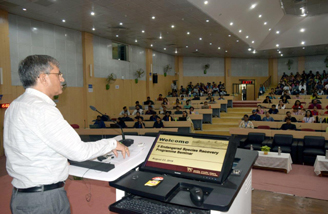 |
 |
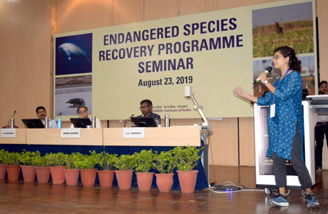 |
 |
 |
Last Updated: August 24, 2019
INSA Teachers Award (2019)
 |
Dr. S. Sathyakumar, Scientist-G, has been awarded the prestigious INSA Teachers Award (2019). This award has been instituted to recognise and honour teachers who have inspired students to take up careers in Science and Technology.
|
Last Updated: August 2, 2019
Wildlife, Environment and Elephant Quiz, 31st July, 2019
|
Wildlife, Environment and Elephant Quiz was organized by Wildlife Institute of India in collaboration with ENVIS Resource Partner on “Wildlife and Protected Areas” and Elephant Cell on 31st July, 2019 to commemorate World Elephant Day to be celebrated on 12th August, 2019. Various schools from Dehradun and Mussoorie participated in the quiz. A total of 36 schools participated for group I category (classes 6, 7 & 8) and 35 schools for group II (classes 9, 10 & 11), which comprised of 213 student participants. The prizes will be awarded to the winners on the ‘World Elephant Day’ celebration program on 12th August, 2019, at the WII auditorium. |
|
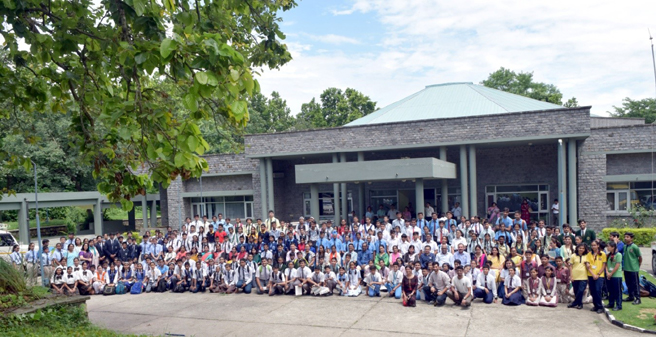 |
|
 |
 |
 |
 |
 |
 |
 |
 |
Last Updated: August 2, 2019

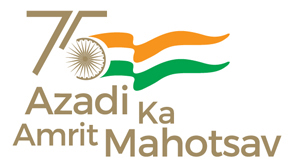
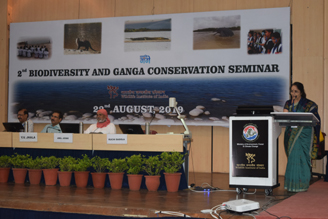
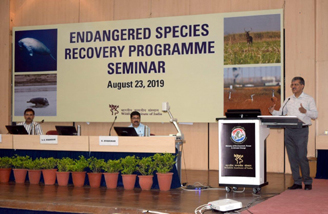 The 2nd Endangered Species Recovery Programme Seminar was conducted at the Wildlife Institute of India on 23rd August, 2019.
The 2nd Endangered Species Recovery Programme Seminar was conducted at the Wildlife Institute of India on 23rd August, 2019. 






